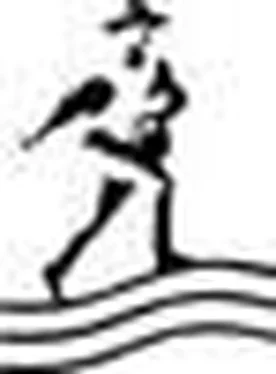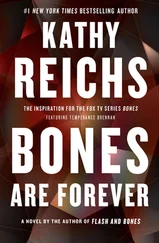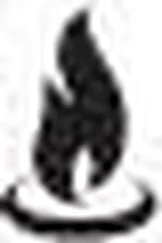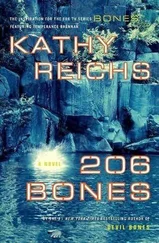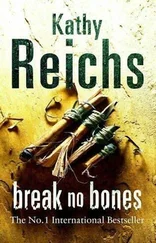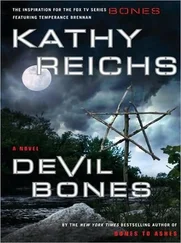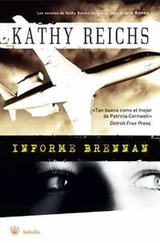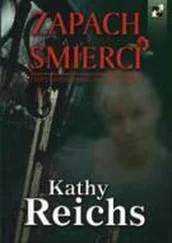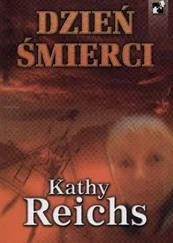Kathy Reichs - Bare Bones
Здесь есть возможность читать онлайн «Kathy Reichs - Bare Bones» весь текст электронной книги совершенно бесплатно (целиком полную версию без сокращений). В некоторых случаях можно слушать аудио, скачать через торрент в формате fb2 и присутствует краткое содержание. Жанр: Старинная литература, на английском языке. Описание произведения, (предисловие) а так же отзывы посетителей доступны на портале библиотеки ЛибКат.
- Название:Bare Bones
- Автор:
- Жанр:
- Год:неизвестен
- ISBN:нет данных
- Рейтинг книги:4 / 5. Голосов: 1
-
Избранное:Добавить в избранное
- Отзывы:
-
Ваша оценка:
- 80
- 1
- 2
- 3
- 4
- 5
Bare Bones: краткое содержание, описание и аннотация
Предлагаем к чтению аннотацию, описание, краткое содержание или предисловие (зависит от того, что написал сам автор книги «Bare Bones»). Если вы не нашли необходимую информацию о книге — напишите в комментариях, мы постараемся отыскать её.
Bare Bones — читать онлайн бесплатно полную книгу (весь текст) целиком
Ниже представлен текст книги, разбитый по страницам. Система сохранения места последней прочитанной страницы, позволяет с удобством читать онлайн бесплатно книгу «Bare Bones», без необходимости каждый раз заново искать на чём Вы остановились. Поставьте закладку, и сможете в любой момент перейти на страницу, на которой закончили чтение.
Интервал:
Закладка:
“Sooner than you think,” he said.
Yes!
After checking a map on Yahoo! I crawled into bed.
Can’t hurt, I thought, echoing Ryan.
How wrong we both were.
33
NEXT MORNING, I WAS UP AT SEVEN-THIRTY. SILENCE IN THE DENsuggested Geneva and Tamela were still dead to the world. After spinning Boyd around the block, I filled pet bowls, set cornflakes and raisin bran on the kitchen table, jotted a note, and hopped into the car.
Clover lies just beyond the North Carolina–South Carolina border, halfway between a dammed-up stretch of the Catawba River, called Lake Wylie, and the Kings Mountain National Park, site of Ryan and Boyd’s Revolutionary War excursion. My friend Anne calls the town Clo-vay, giving the name a je ne sais quoi panache.
During off-peak traffic hours the trip to Clo-vay takes less than thirty minutes. Unfortunately, every driver registered in either the Palmetto or the Old North State was on the road that morning. Others had joined them from Tennessee and Georgia. And Oklahoma. And Guam. I crept down I-77, alternately sipping my Starbucks and drumming the wheel.
Clover was incorporated in 1887 as a railway stopover, then boomed as a textile center in the early nineteen hundreds. Water seepage from the railroad tanks kept the place damp and carpeted with clover, earning it the name Cloverpatch. Aspiring to a more imposing image, or perhaps wanting to dissociate from the Yokums and the Scraggs, some citizens’ committee later shortened the name to Clover.
The image polishing didn’t help. Though Clover is still home to a few mills, and things like brake parts and surgical supplies are cranked out nearby, nothing much happens there. A perusal of chamber of commerce literature suggests that good times are had elsewhere: Lake Wylie, the Blue Ridge Mountains, the Carolina beaches, Charlotte Knights baseball games, Carolina Panthers football games.
There are a few antebellum homes hiding in the hills around Clover, but it’s not a place for French country hand towels and stripy umbrellas. Though very Norman Rockwell, the town is strictly blue-collar, or, more correctly, no-collar.
By nine-forty I was at the point where US 321 crosses SC 55, the beating heart of downtown Clover. Two-and three-story redbrick buildings lined both blacktops forming the intersection. Predictably, Route 321 was called Main Street along this stretch.
Remembering the Yahoo! map, I went south on 321, then made a left onto Flat Rock Road. Three more rights and I found myself on a dead-end street lined with longleaf pines and scrub oaks. The address Zamzow had given me led to a double-wide on a cement slab eighty yards down at the far end.
A front stoop held two metal lawn chairs, one bare, the other with green floral cushions in place. To the right of the trailer I could see a vegetable garden. The front yard was filled with whirligigs.
A carport hung by suction cups to the trailer’s left end, its interior filled with oddly shaped stacks covered with blue plastic sheeting. A stand of shagbark hickories threw shadows across a rusted swing set to the left of the carport.
I pulled onto the gravel drive, killed the engine, and crossed the yard to the front door. Among the whirligigs I recognized Little Bo Peep. Sleepy and Dopey. A mother duck leading four miniature versions of herself.
A skeletal woman with eyes that seemed too large for her face answered the bell. She wore a saggy, pill-covered cardigan over a faded polyester housedress. The garments draped her fleshless form like clothes hanging on a hanger.
The woman spoke to me through an aluminum and glass outer door.
“Got nothing this week.” She stepped back to close the inner door.
“Mrs. Cobb?”
“You with the kidney people?”
“No, ma’am. I’m not. I’d like to talk to you about your daughter.”
“Got no daughter.”
Again the woman moved to close the door, then hesitated, vertical lines creasing the bone-tight flesh on her forehead.
“Who are you?”
I dug a card from my purse and held it to the glass. She read the card then looked up, eyes filled with thoughts that had nothing to do with me.
“Medical examiner?” she said.
“Yes, ma’am.” Keep it simple.
The aluminum grillwork rattled when she pushed open the door. Cold seeped outward, like air from a recently unlocked tomb.
Wordlessly the woman led me to the kitchen and gestured toward a small table with antique green legs and a simulated wood top. The trailer’s interior smelled of mothballs, pine disinfectant, and old cigarette smoke.
“Coffee?” she asked as I seated myself.
“Yes, please.” The thermostat must have been set at fifty-eight. Goose bumps were forming on my neck and arms.
The woman took two mugs from an overhead cabinet and filled them from a coffeemaker on the counter.
“It is Mrs. Cobb, isn’t it?”
“It is.” Mrs. Cobb set the mugs on the simulated wood. “Milk?”
“No, thank you.”
Sliding a pack of Kools from the top of the refrigerator, Mrs. Cobb took the chair opposite mine. Her skin looked waxy and gray. A growth protruded from a comma below her left eyelid, looking like a barnacle on the side of a pier.
“Got a light?”
I dug matches from my purse, struck one, and held it to her cigarette.
“Can’t ever find the darned things when I need them.”
She inhaled deeply, exhaled, flicked a finger at the matches.
“Put those away. I don’t want to be smoking too many.” She snorted a laugh. “Bad for my health.”
I shoved the matches into my jeans pocket.
“You want to talk about my child.”
“Yes, ma’am.”
Mrs. Cobb fished a Kleenex from a sweater pocket, blew her nose, then took another drag.
“My husband’s dead two years come November.”
“I’m sorry for your loss.”
“He was a good, Christian man. Headstrong, but a good man.”
“I’m sure you miss him.”
“Lord knows I do.”
A cuckoo popped from its clock above the sink and sounded the hour. We both listened. Ten chirps.
“He gave me that clock for our twenty-fifth wedding anniversary.”
“It must be very dear to you.”
“Fool thing’s kept working all these years.”
Mrs. Cobb drew on her Kool, eyes fixed on a point midway between us. On a point years past. Then her chin cocked up as a sudden thought struck her.
Her gaze shifted to me.
“You find my child?”
“We might have.”
Smoke curled from her cigarette and floated across her face.
“Dead?”
“It’s a possibility, Mrs. Cobb. The ID is complicated.”
She brought the cigarette to her lips, inhaled, exhaled through her nose. Then she flicked the ash and rotated the burning tip on a small metal saucer until the fire went out.
“I’ll be joining Charlie Senior shortly. I believe it’s time to set a few things right.”
She rose from her chair and shuffled toward the back of the trailer, slippers swishing on the indoor-outdoor carpet. I heard rustling, what sounded like a door.
Minutes cuckooed by. Hours. A decade.
Finally, Mrs. Cobb returned with a bulky green album bound with black cording.
“I think the old goat will forgive me.”
She laid the album in front of me and opened it to the first page. Her breathing sounded wheezy as she leaned over my shoulder to jab at a snapshot of a baby on a plaid blanket.
The finger moved to a baby in an old-fashioned bassinet. A baby in a stroller.
She flipped ahead several pages.
A toddler holding a plastic hammer. A toddler in blue denim coveralls and bicycle cap.
Two more pages.
A towheaded boy of about seven in cowboy hat and twin holsters. The same boy suited up for baseball, bat on one shoulder.
Читать дальшеИнтервал:
Закладка:
Похожие книги на «Bare Bones»
Представляем Вашему вниманию похожие книги на «Bare Bones» списком для выбора. Мы отобрали схожую по названию и смыслу литературу в надежде предоставить читателям больше вариантов отыскать новые, интересные, ещё непрочитанные произведения.
Обсуждение, отзывы о книге «Bare Bones» и просто собственные мнения читателей. Оставьте ваши комментарии, напишите, что Вы думаете о произведении, его смысле или главных героях. Укажите что конкретно понравилось, а что нет, и почему Вы так считаете.
